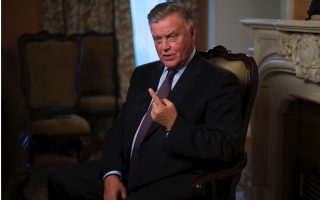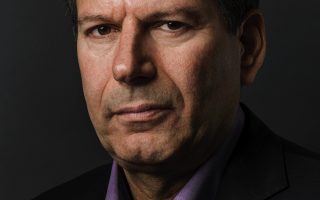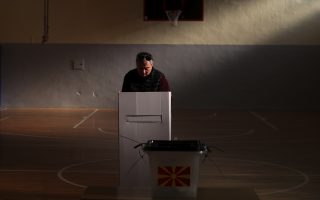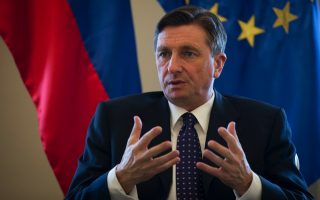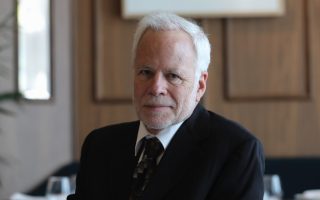‘Russia using hybrid warfare to attack democracy’

Damon M. Wilson, executive vice president of the Atlantic Council, was recently invited to participate in a debate on Eastern Mediterranean geopolitics at the Delphi Economic Forum. In an interview with Kathimerini on the sidelines of the four-day conference, Wilson, who served as special assistant to US President George W. Bush and senior director for European affairs at the National Security Council from 2007 to 2009, speaks about Moscow’s meddling in the 2016 US presidential elections as well as the upcoming European Parliament elections, US-Russia ties during the administration of Donald Trump, and Europe’s energy dependence on Russia.
He also talks about the deep polarization of American society, the roles of the US and Russia in the Balkans and his concern over a new arms race following Washington’s plans to withdraw from the Intermediate-Range Nuclear Forces (INF) Treaty.
What is your take on Russian meddling in the US elections 2016, last year’s midterms and the upcoming European elections?
We have seen an extraordinary degree of Russian intervention, in ways that go beyond elections. It is a coherent and coordinated Russian strategy to create divisions in democratic societies as a means of undermining our will, stamina and ability to compete.
Russia cannot handle a head-on direct challenge to the West. If you look at the size of our economies, the trajectory of our populations and our demographics, we have strong momentum, unlike Russia. So instead, we see an embrace of a hybrid warfare approach that directly attacks democracies through what are, no doubt, real issues in our society. America already has a race issue, Russia did not create that, but we saw a definite attempt to polarize and divide on top of it. This is not an American issue but it occurs repeatedly across the world, including here in Greece in the context of the Prespes agreement. Obviously the Macedonia naming dispute is a difficult issue even without the Russians. But the Kremlin offers fuel to the fire, and as we are heading towards European elections we have to anticipate it escalating.
In Europe the interesting thing is that we don’t see a core issue that Russians are backing. They are supporting far-right, far-left, or anti-systemic voices – the common thread is divisions meant to cause chaos. For any of us who think this is not a challenge, we just have to keep our eyes open and see what is unfolding.
Do you believe we are on the brink of a new arms race, considering the looming annulment of the INF Treaty?
I think arms control is back on the agenda as we are witnessing a breakdown of the arms control regime, particularly in Europe. We need to remember it is not because the Trump administration withdrew from the INF. It is because the Russians violated the conventional forces treaty, the Vienna Document protocols that call for transparency, and also systematically abused the INF Treaty.
The options for the alliance were either ignoring that and just continuing to keep the edifice of arms control agreements when Russians violate them systematically, or to face the reality and call a spade a spade. It is painful but it is what we have done.
It now opens up a challenge – the lack of arms control is a big risk for Europe – but also an opportunity if we can think bigger. Part of the reason this began to unravel is because of China and its capacity to produce intermediate-range nuclear weapons. So can we use this opportunity to pursue a more comprehensive set of arms control agreements that look at strategic intermediate-range and tactical short-range battles? If you’re in Europe that is the real concern. And, second, is there a way to multilateratize these treaties and include Russia and China (who are the real threats here)?
Do you predict German realpolitik in pursuing a new gas pipeline across the Baltic Sea (Nord Stream 2) will prevail over European reservations concerning energy dependence on Moscow?
This is a messy issue, because it exposes the degree of hypocrisy in European strategy and policy. It has been an issue for many of the countries we hear from in Central and Eastern Europe. They say: “Wait a second, we’re being really squeezed for our dependence on Russian oil and gas, and at the same time we have this strategy of supporting Ukraine. And here we have a capstone signature project with Germany at the helm that is a mortal blow to energy transit across Ukraine and a significant deepening of dependence on Russian sources.” That is not so good. I suspect Nord Stream won’t stop, but some guidelines on what is acceptable in energy negotiations will be put in place, which is a step forward.
I still think it is a strategic shortcoming that Europe is unable to deal with Russia as an entity with a coherent policy committed to diversity of energy sources.
We saw Russian President Vladimir Putin focusing for the first time on social issues in his annual state-of-the-nation address. His popularity has been diminishing in recent months. Do you see the beginnings of the end of the Putin era?
I think it is hard to be speculative here, because the thing about authoritarian regimes is that they are strong in control, until they are not. The fundamental challenge of those regimes is a lack of legitimacy when it comes to succession.
What fundamentally happened in Russia I think is that the social contract broke down. Putinism initially stated, “You stay out of politics and your life will be more prosperous.” The economy took a hit and that wasn’t going so well, so we saw it replaced by a new identity of nationalism, chauvinism, traditional family values and this orthodox identity, while at the same time generating hysteria that Russia was under threat from the US and West, which is frankly ridiculous. Talk about American invasions and fascist coups being established in Ukraine and whatnot – all to inflate a sense of “only I could protect Mother Russia.”
That story is getting old, and there is a sense that things aren’t as rosy as the Kremlin says they are. We see it with pensions, social security issues, decreasing standards of living and an unprecedented degree of uncoordinated protests across the country. Those are signals that nationalism can’t solve the problems of the people.
We are witnessing a growing Russia-US clash on several fronts, from Syria to Turkey (regarding the sale of S-400 missiles to Ankara) to Venezuela. Is Trump’s presidency bringing the two countries closer or widening the gap between them?
We are a little bit schizophrenic right now, and it’s complicated and dangerous. We have shown a Putin who enjoyed being unpredictable that we can be as unpredictable. The irony is that right now the US, with unprecedentedly strong support from the administration and Congress, wants to take policies and measures to stand up to Russia and Putin and stand by our allies. We are seeing a bolstering of our NATO alliance and US forces in Europe’s East, and a movement to make NATO fit for purpose and not a passive deterrent mechanism.
Yet, we have this uncertainty introduced from President Trump through his own rhetoric, which is sometimes inexplicable, softening the edges, questioning certain policies, and with the strange Helsinki summit in the summer. All of this happening in the shadow of the Mueller investigation – so bear with us as we are in the middle of a national drama right now. The problem is that Russia is now a bit of a political domestic issue. When you look at Russia in a strategic international sense, the US is pretty consistent across the board that Putin is a bad guy and we need to be careful. There is a consensus here among Democrats and Republicans. But because of Trump and the Mueller investigation, this is a bit of a political football and that’s why it looks more uncertain internationally than it actually is.
What about the Balkans – including Greece? Do you see an opportunity for Russia to implement its soft power diplomacy in the region, or do you believe the region is turning its gaze toward the West, after the Prespes agreement that opened the door for entry talks with the EU?
I think it’s a little bit of both. Russia’s strategy in the Balkans is not to build something beautiful and grandiose by taking tough decisions, but to disrupt the region and stop the process of reform on the ground that leads to integration with Europe. It is far easier to have a policy of geopolitical strategy to mess something up rather than to build something meaningful. So that’s not going to go away, and we expect to see Russia play with the perception of a great strategic partnership in Serbia – an illusion – or efforts to sow divisions in Montenegro and North Macedonia in the wake of the deal.
At the same time, we are undeniably winning. The people of the Western Balkans want their children in Europe, their people’s children to be educated in Europe, they want to work for European and American companies. We have already seen the progress of Montenegro, and Greece just delivered a huge strategic win with the Prespes agreement. We have momentum, and now the challenge is for Washington to work closely with Athens as a partner in achieving the vision of Thessaloniki, for the entire region to be integrated with Europe.
